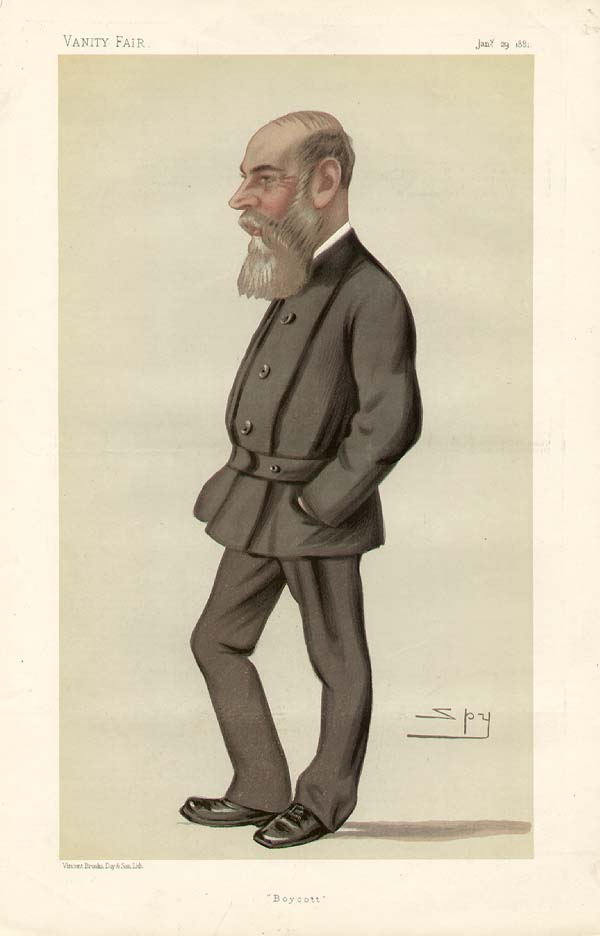
Why do we say boycott? The word comes from a British land agent who lived in Ireland. His name was Captain Charles Cunningham Boycott.
He was born in England in 1832. He joined the army when his family paid for his commission in 1850. He was not able to join on the strength of his own merits. His regiment was transferred to Belfast and then Dublin. In 1852 Boycott got married and then he sold his commission and left the army in 1853. He used an inheritance to rent some land on Achill Island, just off the west coast of Ireland. By his own accounts, he worked very hard and he was able to use the profits from his land and another inheritance to buy a large house on the island. If he had stayed there and continued to work the land, we would not have the word “boycott” today.
Charles Boycott moved to Lough Mask House in 1873. It was in County Mayo, near to the town of Ballinrobe and it was owned by the 3rd Earl of Erne, John Crichton. He was a very wealthy landowner. Charles Boycott signed on as the Earl’s land agent. That meant he had to make sure tenants obeyed the rules of the land and to collect rents from them. He was paid 10% of the rents he collected. Over half of the land in Ireland was owned by rich people who generally lived elsewhere. They employed people like Boycot to manage their land. The majority of farmers didn’t own their land. They rented, usually on a one-year contract and they had very little rights.
The farmers were starting to get fed up with their lack of rights by the 1850s and groups of them came together to demand more rights. They called for the “3 Fs”. Fair rent, Fixity of tenure, and Free sale. They organized demonstrations when farmers were unfairly evicted. They had supporters as high as the Irish government and Charles Stewart Parnell, a politician, gave a speech where he planted the seeds of what would become boycott. He said, “When a man takes a farm from which another has been evicted, you must shun him on the roadside when you meet him – you must shun him in the streets of the town – you must shun him in the shop – you must shun him on the fair green and in the market place, and even in the place of worship, by leaving him alone, by putting him in moral Coventry, by isolating him from the rest of the country, as if he were the leper of old – you must show him your detestation of the crime he committed.”
Charles Boycott was very unpopular. Not only was he an Englishman in Ireland, he was petty, overzealous, and he looked down on all of the people that he managed. Had he been a better person, we would not have the word “boycott”.
In 1880, 22nd of September, Boycott had to serve eviction notices to 11 households living on the Earl’s land. The harvest had been poor, and the farmers had asked for a 25% reduction in their rent. Boycott had said they could have a 10% cut and eleven farmers couldn’t pay their rent. When the police turned up to enforce the eviction notices, they were chased away and about 100 people stormed Boycott’s house. They “persuaded” Boycott’s staff, servants, and laborers to leave. He was left to run his own farm with only the help of his wife and four family members who happened to be staying. In town, the blacksmith, postman, laundress, and everybody else he would need to do business with were persuaded not to serve him. He was completely ostracized. He couldn’t buy any supplies in town and had to have them shipped over by boat from the mainland.
Within a month, people had started to refer to what they were doing as “to boycott”. His name had become a verb. Rumor has it that a local priest who played a big part in the demonstrations wanted a word that was easier to remember than ostracize. And yet, even then, it might not have become a common word if Boycott had simply left. He didn’t though. He wrote a letter to the Times newspaper, complaining about his situation and his story went global, taking the new word with it. It was first recorded in a dictionary in 1888, 8 years after the situation had occurred.
Boycott couldn’t harvest his crops on his own, so the government sent out soldiers to help him. It ended up costing far more to harvest the crops than they were actually worth. After the harvest, Boycott couldn’t go back to his old life, and he was forced to sell his farm and move. He became a land agent elsewhere, but his health suffered, and he died in 1897 at the age of 65.
So, why do we say boycott? The word comes from Captain Charles Boycott, who was completely ostracized. And this is what I learned today.
https://en.wikipedia.org/wiki/Charles_Boycott
https://www.historyireland.com/captain-boycott-man-and-myth/
https://everything-everywhere.com/charles-cunningham-boycott/
